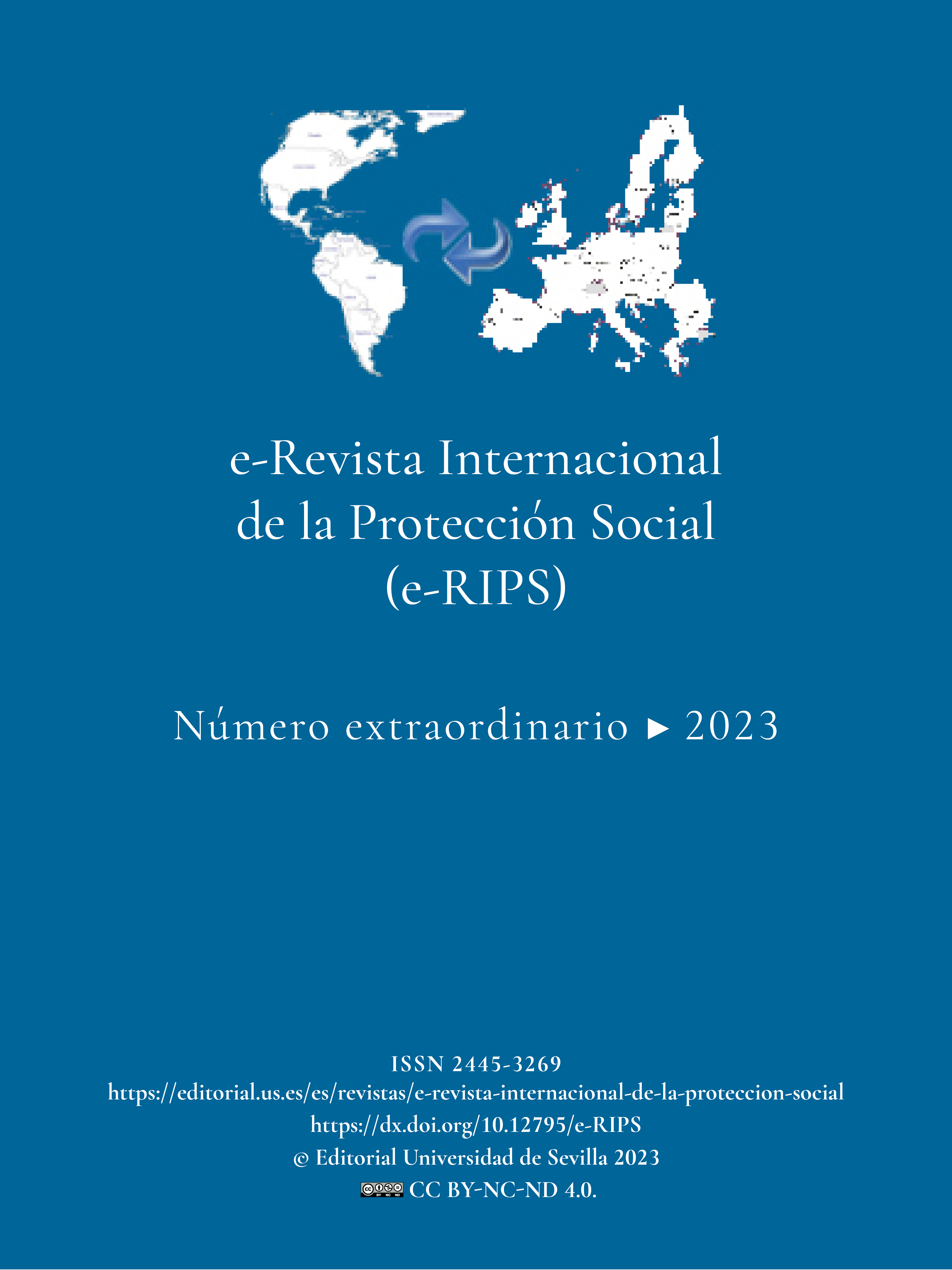Los/as trabajadores/as de plataforma en el marco del Derecho europeo
DOI:
https://doi.org/10.12795/e-RIPS.2023.mon.05Palabras clave:
Trabajadores/as de plataforma, Unión Europea, Clasificación jurídica, Nivel mínimo de derechos, Definición europea de trabajador/aResumen
Este artículo trata de entender el camino de las instituciones europeas para reforzar la protección de los trabajadores de plataformas y lo que significaría introducir una definición europea de trabajador. Para ello, se revisará la principal jurisprudencia del Tribunal de Justicia de la Unión Europea relativa al concepto de trabajador, el intento de definición legal de trabajador a nivel europeo, las directrices de la Comisión Europea para la regulación del régimen jurídico de determinados tipos de autónomos y, por último, la propuesta de directiva para los trabajadores de plataformas.
Descargas
Citas
Ales, E.; Curzi Y.; Fabbri, T.; Rymkevich, O.; Senatori, I.; Solinas, G. Working in digital and smart organizations. Palgrave Macmillan, 2018.
Aloisi, A:. “Negotiating the digital transformation of work: Non-standard workers’ voice, collective rights and mobilisation practices in the platform economy” EUI Working Papers, 2019, http://dx.doi.org/10.2139/ssrn.3404990
Cherry, M. A.: “Regulatory options for conflicts of law and jurisdictional issues in the on-demand economy”, ILO Conditions of Work of Employment Series n.106, 2019.
Corazza, L. & Razzolini, O.: “Who is an employer?”, in Finkin, M W. & Mundlak, G (eds.): Research Handbook in Comparative Labor Law. Edward Elgar Publishing, 2015.
Countouris, N.: An Autonomous EU definition of ‘Worker’ - Pitfalls and Opportunities for the European Labour Movement’. ETUC, 2015.
De Stefano, V. “The Rise of the Just-in-Time Workforce: On-Demand Work, Crowdwork, and Labor Protection in the Gig-Economy”, Comparative Labor Law & Policy Journal, 37/2015.
De Stefano, V. & Aloisi, A.:“European legal framework for “digital labour platforms”. JRC. 10.2760/78590, 2019.
Deakin, S.: “Does the ‘personal employment contract’ provide a basis for the reunification of employment law?” Industrial Law Journal, 36(1), 2007.
ETUC: “Legal feasibility of the ETUC proposal”. Document written by Judith Brockmann, Marie-Cé cile Escande Varniol, Cé cile Nicod and Daniel Pérez del Prado, under contract of the ETUC project on (grant agreement VP/2018/006/0090) “Establishing workers representation and social dialogue in the platform and app economy”, 2021.
Ewing, K. D.; Hendy, J. & Jones, C.: A manifesto for labour law: towards a comprehensive revision of workers’ rights. IER, 2016.
Freedland, M.: The Personal Employment Contract, Oxford Scholarship Online. 10.1093/acprof:oso/9780199298631.001.0001, 2003.
Giubboni, S.: “Being a worker in EU law” European Labour Law Journal, 9(3), 2018, 223-235. https://doi.org/10.1177%2F2031952518791828
Lianos, I.; Countouris, N. & De Stefano, V.: “Re-thinking the competition law/labour law interaction: Promoting a fairer labour market”, European Labour Law Journal 10(3), 2019.
Mazmanian, M.; Orlikowski, W. J.; Yates, J. “The Autonomy Paradox: The Implications of Mobile Email Devices for Knowledge Professionals”, Organization Science 24, 5 (October 2013): 1337–1357, Institute for Operations Research and the Management Sciences (INFORMS).
Menegatti, E.: “The Evolving Concept of “worker” in EU law”, Italian Labour Law e-Journal, issue 1, vol. 12. 2019.
Perulli, A.: “The legal and jurisprudential evolution of the notion of employee”, European Labour Law Journal, 11(2), 2021, 117-130.
Prassl, J.: Humans as a service: The promise and perils of work in the gig economy. OUP Oxford, 2018.
Ratti, L.: “Agency Work and the Idea of Dual Employership: A Comparative Perspective”. Comparative Labor Law & Policy Journal, 30, 2009, 835-874.
Ratti, L.: “Online platforms and crowdwork in Europe: A two step approach to expanding agency work provisions”. Comparative Labor Law & Policy Journal 38(2), 2018, 477-511.
Risak, M. & Dullinger, T.: The concept of ‘worker’ in EU law. Status quo and potential for change. ETUI. Report 140, 2018.
Sanz de Miguel, P.; Bazzani T. and Arasanz J.: “Deccomodifying Platform Work through an EU Definition of Worker”, Glocalism, 3, 2022, DOI: 10.12893/gjcpi.2022.3.1
Sanz de Miguel, P.; Bazzani T. and Arasanz J.: The definition of worker in the platform economy. Exploring workers’ risks and regulatory solutions, 2021, European Economic and Social Committee: https://www.eesc.europa.eu/sites/default/files/files/qe-05-21-286-en-n_0.pdf
Sciarra, S.: The Evolution of Labour Law (1992-2004). Employment and social affairs. European Commission, 2005.
Waas, B.: “The Position of Workers in the Collaborative Economy - A view on EU law”., in Singer, R. & Bazzani, T. (eds.): European Employment Policies: Current Challenges (97-121). BWV Berliner Wissenschafts-Verlag. 2017.
Publicado
Cómo citar
Número
Sección
Licencia
Derechos de autor 2023 Tania Bazzani

Esta obra está bajo una licencia internacional Creative Commons Atribución-NoComercial-CompartirIgual 4.0.
e-Revista Internacional de la Protección Social es una revista de acceso abierto, lo que significa que todo su contenido está disponible gratuitamente para el usuario o su institución. Los usuarios pueden leer, descargar, copiar, distribuir, imprimir, buscar o enlazar con el texto completo de los artículos, o utilizarlos para cualquier otro fin lícito, sin solicitar permiso previo al editor o al autor. Esta definición de acceso abierto se ajusta a la Iniciativa de Acceso Abierto de Budapest (BOAI).
 4.0
4.0
A menos que se indique lo contrario, todo el contenido de la edición electrónica se distribuye bajo una " licencia internacional Creative Commons Atribución-Nocomercial-Compartirigual 4.0 Internacional". Puede consultar la versión informativa y el texto legal de la licencia aquí. Esto debe indicarse expresamente de esta manera cuando sea necesario.
En caso de aceptación del manuscrito, los autores ceden los derechos de la obra para su publicación a eRIPS. Revista Internacional de la Protección Social bajo el contrato de licencia Reconocimiento-NoComercial-CompartirIgual 4.0 Internacional (CC BY-NC-SA 4.0). Los autores conservan los derechos de autor y terceros están autorizados a compartir y adaptar la obra, siempre que cumplan con los términos y condiciones establecidos en la licencia.
- Usted debe dar crédito de manera adecuada , brindar un enlace a la licencia, e indicar si se han realizado cambios . Puede hacerlo en cualquier forma razonable, pero no de forma tal que sugiera que usted o su uso tienen el apoyo de la licenciante.
- Usted no puede hacer uso del material con propósitos comerciales .
- Si remezcla, transforma o crea a partir del material, debe publicar sus contribuciones bajo la misma licencia que el original.
Se puede encontrar más información en https://creativecommons.org/licenses/by-nc-sa/4.0/deed.es
Se permite y recomienda a los autores/as difundir su obra a través de Internet (p. ej.: en archivos telemáticos institucionales o en su página web) antes y durante el proceso de envío, lo cual puede producir intercambios interesantes y aumentar las citas de la obra publicada.











